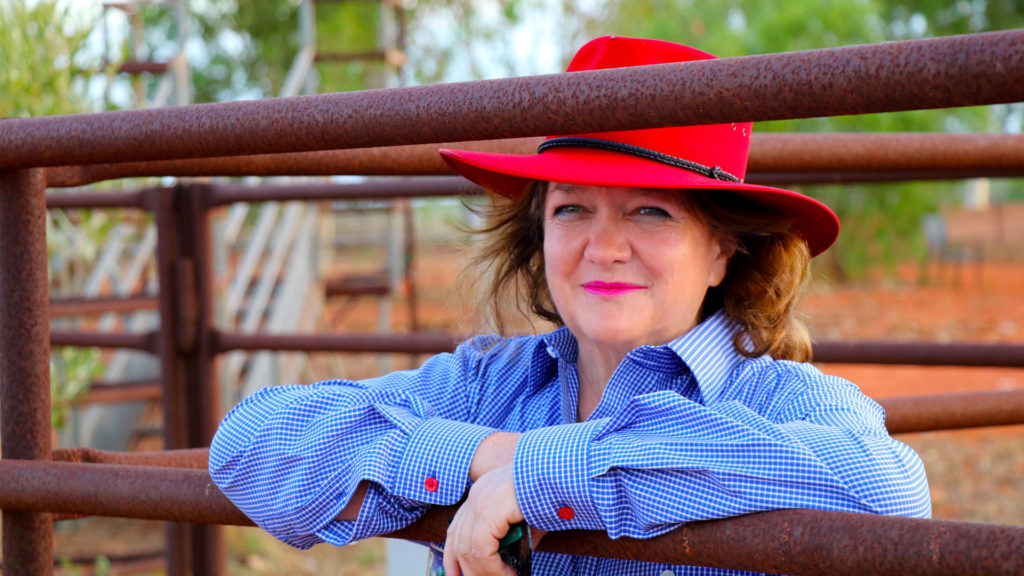Reuters | April 9, 2024 |

Australian mining magnate Gina Rinehart.
(Image courtesy of Sponto News | YouTube)
US rare-earths producer MP Materials said Australian billionaire Gina Rinehart’s mining firm had taken a 5.3% stake in the company, expanding her investments in the mineral ore sector.

In a regulatory filing last week, the Nevada-based miner said Hancock Prospecting, owned by Australia’s richest person Rinehart, holds about 8.8 million shares of MP Materials.

MP Materials is the second-biggest producer of rare earths outside China after Australia’s Lynas Rare Earths. Lynas ended talks with MP Materials over a potential merger in February.
Hancock declined to comment on Wednesday.
The iron ore miner has been building stakes in critical minerals projects, including rare earths. Hancock’s investments include a 6.17% stake in Brazilian Rare Earths and a 9.14% holdings in Arafura Rare Earths, according to LSEG data.
(By Melanie Burton and Roshia Sabu; Editing by Maju Samuel and Sherry Jacob-Phillips)
Read More: MP Materials awarded $58.5 million tax credit for Texas rare earth magnet factory
US rare-earths producer MP Materials said Australian billionaire Gina Rinehart’s mining firm had taken a 5.3% stake in the company, expanding her investments in the mineral ore sector.

In a regulatory filing last week, the Nevada-based miner said Hancock Prospecting, owned by Australia’s richest person Rinehart, holds about 8.8 million shares of MP Materials.

MP Materials is the second-biggest producer of rare earths outside China after Australia’s Lynas Rare Earths. Lynas ended talks with MP Materials over a potential merger in February.
Hancock declined to comment on Wednesday.
The iron ore miner has been building stakes in critical minerals projects, including rare earths. Hancock’s investments include a 6.17% stake in Brazilian Rare Earths and a 9.14% holdings in Arafura Rare Earths, according to LSEG data.
(By Melanie Burton and Roshia Sabu; Editing by Maju Samuel and Sherry Jacob-Phillips)
Read More: MP Materials awarded $58.5 million tax credit for Texas rare earth magnet factory
Gina Rinehart-backed lithium hopeful surges after demo batch
Bloomberg News | April 11, 2024 |

Gina Rinehart is Australia’s richest person. (Image: Gina Rinehart website)
Australia-listed lithium developer Vulcan Energy Resources Ltd. has gained nearly 40% this week after announcing its first viable output using direct-extraction technology, an emerging technique for producing the battery material.

The firm’s demonstration plant in Landau, Germany, delivered a batch of lithium chloride in line with the quality it eventually plans to make commercially, Vulcan said in a statement on Thursday. The firm backed by Australia’s richest woman Gina Rinehart has agreements to supply European carmakers including Stellantis, Renault SA, and Volkswagen AG.
The firm’s shares jumped about 13% on Wednesday and closed 24% higher on Thursday.
Direct lithium extraction, or DLE, is seen as a promising production technique because it radically reduces the time needed to convert lithium brine into a form suitable for battery manufacturing. But it has faced widespread skepticism, and is still relatively untested at commercial scale.
“We see this as a major step forward for the company, a validation of Vulcan’s extensive work to date and of our view that DLE has a role to play in the lithium supply chain,” analysts from Cannacord Genuity Ltd. said in an emailed note.
Vulcan is planning to start market-ready production in 2026, executive chairman Francis Wedin said in an email interview. The company is still seeking to secure funding for that first phase, which will make 24,000 tons of lithium hydroxide annually — enough to supply batteries for half a million electric vehicles.
“Construction will take just over two years, and the clock starts ticking once financing is complete,” Wedin said. The company is in talks with potential strategic investors, including oil and gas and automotive companies, to buy equity, Vulcan said..
Vulcan said the demo production in Germany was the first lithium chloride sourced and produced within Europe. The project will use geothermal energy to power its plant, reducing carbon emissions, it said.
(By Paul-Alain Hunt)
Bloomberg News | April 11, 2024 |

Gina Rinehart is Australia’s richest person. (Image: Gina Rinehart website)
Australia-listed lithium developer Vulcan Energy Resources Ltd. has gained nearly 40% this week after announcing its first viable output using direct-extraction technology, an emerging technique for producing the battery material.

The firm’s demonstration plant in Landau, Germany, delivered a batch of lithium chloride in line with the quality it eventually plans to make commercially, Vulcan said in a statement on Thursday. The firm backed by Australia’s richest woman Gina Rinehart has agreements to supply European carmakers including Stellantis, Renault SA, and Volkswagen AG.
The firm’s shares jumped about 13% on Wednesday and closed 24% higher on Thursday.
Direct lithium extraction, or DLE, is seen as a promising production technique because it radically reduces the time needed to convert lithium brine into a form suitable for battery manufacturing. But it has faced widespread skepticism, and is still relatively untested at commercial scale.
“We see this as a major step forward for the company, a validation of Vulcan’s extensive work to date and of our view that DLE has a role to play in the lithium supply chain,” analysts from Cannacord Genuity Ltd. said in an emailed note.
Vulcan is planning to start market-ready production in 2026, executive chairman Francis Wedin said in an email interview. The company is still seeking to secure funding for that first phase, which will make 24,000 tons of lithium hydroxide annually — enough to supply batteries for half a million electric vehicles.
“Construction will take just over two years, and the clock starts ticking once financing is complete,” Wedin said. The company is in talks with potential strategic investors, including oil and gas and automotive companies, to buy equity, Vulcan said..
Vulcan said the demo production in Germany was the first lithium chloride sourced and produced within Europe. The project will use geothermal energy to power its plant, reducing carbon emissions, it said.
(By Paul-Alain Hunt)
No comments:
Post a Comment